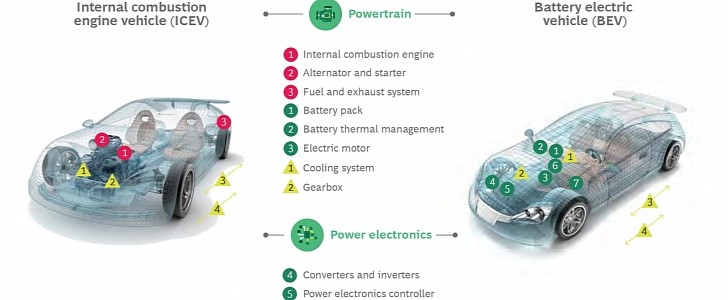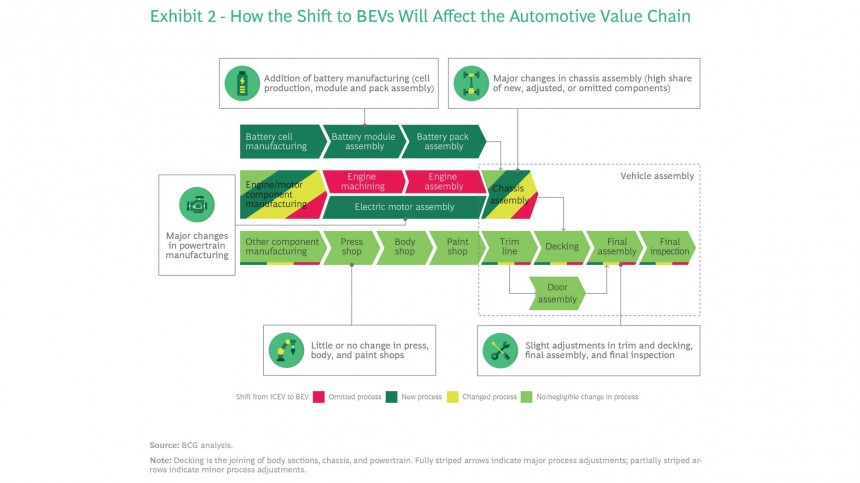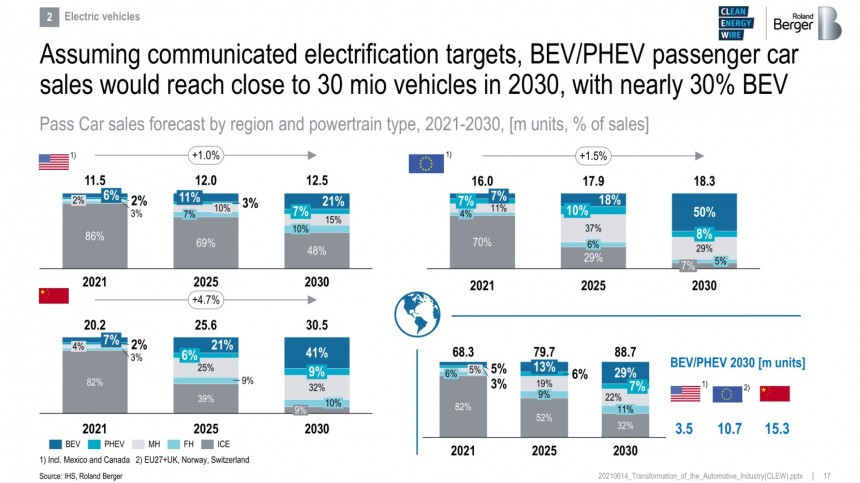You are watching new and more compelling electric vehicles hit the market. But, if you think it is still up to debate whether they will take over or not, we have sad news: that is not up for discussion anymore. Considering how the automotive industry works now for where it wants to be in three to five years, three specialists agree that the debate, at this point, is mostly theoretical.
We had the chance to talk to them thanks to CLEW (Clean Energy Wire). This German journalism organization aims to incentivize news about the energy transition going around worldwide and promoted the digital research tour “The future of the European car industry: the challenge of industrial transformation.” We are among the 15 selected journalists to cover that.
On June 14, the discussion ended up being about the costs that transition will have when it comes to jobs. CLEW invited Wolfgang Bernhart, a senior partner at Roland Berger’s Automotive Competence Center, Daniel Küpper, managing director and partner at Boston Consulting Group, and Jon Stenning, associate director at Cambridge Econometrics. Those are the executives that believe the ship has sailed.
We asked them if government policies forbidding the sales of combustion-engined cars are not risking creating an artificial market for electric vehicles. When all incentives are gone, they might not yet be mature enough to compete with ICE technologies.
Moreover, companies dedicated to them may go bust if they don’t make money from selling automobiles and still depend on carbon credits and other compensatory regulations. Küpper was the one who phrased that this is no longer up to discussion.
“This train has departed. The electric car is already in the plans of the automotive industry, and there’s no going back at this point.”
Bernhart agreed and said that profitability is also an issue with current ICE vehicles.
“Big and luxurious cars are profitable. On the other hand, small, high-volume vehicles normally present losses.”
What is still up to debate is how governments and companies will deal with the people who are no longer needed for car production. While these specialists do not think that the impact will be massive when it comes to automakers, Küpper stated it will be relevant: up to 17% of job losses. It could be worse.
Still according to the BCG partner, suppliers dedicated to ICE components will lose 40% of their workforce – if they survive, obviously. Suppliers that are not dedicated to combustion engines will see an increase in their number of employees of about 9 percent. Stenning stated that this is not the only way out for people currently involved with car production.
“Green energy will absorb a lot of people. We also have to remember that creating the infrastructure, installing fast chargers and so forth will also demand manpower.”
Another way to address that will be retraining these workers for other activities. That will depend on policy makers worrying about them as much as they are concerned with climate change.
According to Bernhart, there is no risk of creating an artificial market for EVs because they already have a demand. What incentives did was to eliminate early adoption barriers. In the study “Transformation of the Automotive Industry: Facts and Figures,” he found out that an average of 55% of consumers in the main automotive markets already consider buying an electric car as their next vehicles.
The study also estimates that 50% of all passenger car sales in Europe will be of EVs. That percentage is slightly lower in China (41%) and much worse in the US (29%) in the current environment. Joe Biden’s intentions of promoting electric cars there are yet to present effects in that regard. Bernhart talked about that.
“Nobody enters a market to lose money. If they could not find a way to have profits, they would not be there. People will eventually learn of the economic benefits of driving an electric car.”
That is already the case in Portugal, a country that is not rich but that has high adoption rates for EVs precisely because they are much cheaper to run. The barrier is the high purchase price compared to similar vehicles, but the three specialists agree that battery prices will fall, leading to more affordable options. Bernhart made just a warning about that.
“The main restriction will be with raw materials. Not only lithium and nickel, but also copper, which is also needed for wind generators. The copper mining industry currently delivers 21 million metric tons per year and it will eventually need 30 million metric tons by 2030. We also have to ensure mining follows environmentally-correct procedures not to create a different problem than that of using oil products.”
On June 14, the discussion ended up being about the costs that transition will have when it comes to jobs. CLEW invited Wolfgang Bernhart, a senior partner at Roland Berger’s Automotive Competence Center, Daniel Küpper, managing director and partner at Boston Consulting Group, and Jon Stenning, associate director at Cambridge Econometrics. Those are the executives that believe the ship has sailed.
We asked them if government policies forbidding the sales of combustion-engined cars are not risking creating an artificial market for electric vehicles. When all incentives are gone, they might not yet be mature enough to compete with ICE technologies.
“This train has departed. The electric car is already in the plans of the automotive industry, and there’s no going back at this point.”
Bernhart agreed and said that profitability is also an issue with current ICE vehicles.
“Big and luxurious cars are profitable. On the other hand, small, high-volume vehicles normally present losses.”
What is still up to debate is how governments and companies will deal with the people who are no longer needed for car production. While these specialists do not think that the impact will be massive when it comes to automakers, Küpper stated it will be relevant: up to 17% of job losses. It could be worse.
“Green energy will absorb a lot of people. We also have to remember that creating the infrastructure, installing fast chargers and so forth will also demand manpower.”
Another way to address that will be retraining these workers for other activities. That will depend on policy makers worrying about them as much as they are concerned with climate change.
According to Bernhart, there is no risk of creating an artificial market for EVs because they already have a demand. What incentives did was to eliminate early adoption barriers. In the study “Transformation of the Automotive Industry: Facts and Figures,” he found out that an average of 55% of consumers in the main automotive markets already consider buying an electric car as their next vehicles.
“Nobody enters a market to lose money. If they could not find a way to have profits, they would not be there. People will eventually learn of the economic benefits of driving an electric car.”
That is already the case in Portugal, a country that is not rich but that has high adoption rates for EVs precisely because they are much cheaper to run. The barrier is the high purchase price compared to similar vehicles, but the three specialists agree that battery prices will fall, leading to more affordable options. Bernhart made just a warning about that.
“The main restriction will be with raw materials. Not only lithium and nickel, but also copper, which is also needed for wind generators. The copper mining industry currently delivers 21 million metric tons per year and it will eventually need 30 million metric tons by 2030. We also have to ensure mining follows environmentally-correct procedures not to create a different problem than that of using oil products.”









